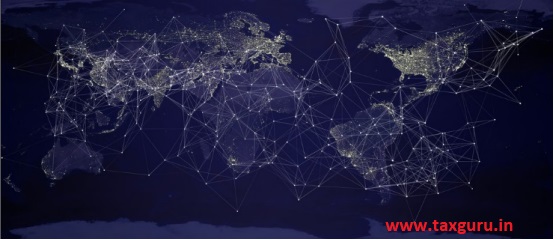The Equalisation levy
A new tax imposed on non-resident eCommerce/online – service/goods provider @2% of the consideration received by them
Background
Business is changing and so is the TAX. Now physical presence is not must to have but client can be served remotely using internet – Digital Business and Digital Economy. Similarly while originally tax laws were focusing on taxing the profit on the parameters of physical presence but now countries looking to tax digital business in one way or the other. Basic idea is to tax the profit on parameter based on the place where uses are there, value is being created and economic activity is carried out rather solely based on the physical presence of provider. Currently most of the countries are working for consensus and in the meantime has levied taxes, named either as Equalisation levy or some other name. Govt. of India is working on the same lines as well and decided to charge “Equalisation Levy” (“EL”)

Government of India, has levied Equalisation levy as an interim tax collection measure back in year 2016. At that time it was limited to online advertisement only – Levy @6% on the online advertisement services provided by non-resident entities. Now Indian Government has extended its scope to cover online provisions of services/supply of goods vide Finance Act 2020.
What’s implication on business?
New equalisation levy may be applicable on your business and be a cost for your business. When it comes to services, the extended scope will cover entities providing online services such as:
- Online education/vocational courses,
- Online assistance in web designing, web hosting, other tools pertaining to IT & ITES
- Providing cloud services, Software as a Services (“SaaS”), Infrastructure as a services (“IaaS”), PaaS,
- Online subscription of magazine – be it general one or pertaining to any specific field such as fashion, legal, accounting, educational or professional etc.
- Online provisions of data, sale of pictures, images, information etc.
What is the extended scope of Equalisation levy
The Charge– Equalisation Levy will be charged @2% of the consideration received or receivable by an e-commerce operator pertaining to specified transactions entered into with certain specific set of person.
- E-commerce operator means a non-resident who owns, operates or manages a digital or an electronic facility or platform for online sale of goods or online provision of services or both
- No EL is to be paid if sales, turnover or gross receipts, as the case may be, of the e-commerce operator from the e-commerce supply or services made or provided or facilitated is less than INR 2 crore (~USD 0.3 mn) during the period 1st April to 31st
- Transactions which are liable to EL, provided in other sections pertaining to advertisement (which is liable @6%) – no EL to be paid under this section of the Act.
The Specified Transactions covered:
- Online sale of goods or provision of services provided by the e-commerce operator;
- Online sale of goods or provision of services or both, facilitated by the e-commerce operator
- Any combination of above-mentioned activities

The specific set of persons with whom transaction are covered:
Consideration received or receivable for the transaction entered into with any of the following persons (Individual or business entity):
a) Person tax resident in India
b) Person Non-resident in following circumstance:
-
- Sale of advertisement, which targets a customer who is resident in India or a customer who accesses the advertisement through internet protocol (IP) address located in India
- Sale of data, collected from a person who is resident in India or from a person who uses internet protocol address located in India
c) Person (resident in India or non resident in India) who buys such goods or services or both using IP address located in India
Other important points:
- Equalisation levy (“EL”) is applicable with effect from 1stApril 2020 with first compliance due date on 7th July 2020.
- Equalisation levy shall not be charged if the e-commerce operator has a PE (a place of business in India which is liable for Indian taxes) in India and the service is effectively connected with such PE.
- All compliances to be done by the eCommerce Operator – EL to be deposited quarterly by eCommerce and annual return to be filed by eCommerce operator. No compliance requirement as such on the buyer/payer.
- EL is not a part of income tax, meaning thereby
- Benefit of tax treaties are not available on El;
- Foreign entities paying EL in India, may not be able to get credit in their residence country.
| Compliance/Action | Periodicity | Period Covered | Due Date |
| Deposition of EL to Indian Govt. | Quarterly | 1St April to 30th June | 7th July |
| 1st July to 30th Sept | 7th Oct | ||
| 1st Oct to 31st Dec | 7th Jan | ||
| 1st Jan to 31st March | 31st March | ||
| Filing of annual statement of EL | Annual | 1st April to 31st March | 30th June |
***
About Author – CA Nitin Goyal (B.Com (H), FCA, DISA, LL.B.)
Nitin is a partner with Manoj A Jain & Co., is a Chartered Accountant and law graduate having 17+ years post qualification experience in Indian tax and regulatory laws. He has experience of working with multinational and Indian business entities covering international & domestic tax matters and regulatory aspect including tax planning & transaction structuring, tax litigation & controversies, tax & regulatory aspect of employee mobility. Nitin has worked with Big 4 consultancy firm and held in-house managerial roles within large multinational organizations (HCL, Chicago Bridge & Iron and Amazon Web Services) overlooking their tax & regulatory functions. His experience allows him to suggest an overall executable solution to the business.
Contact US – nitingoyal@manojajain.com;





